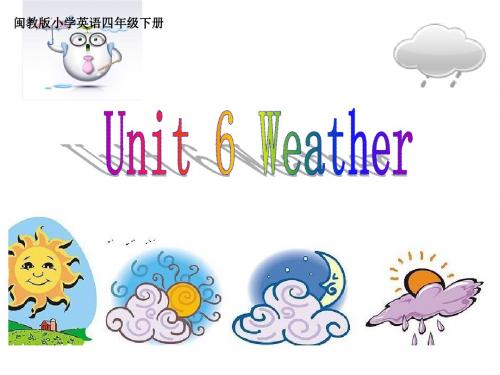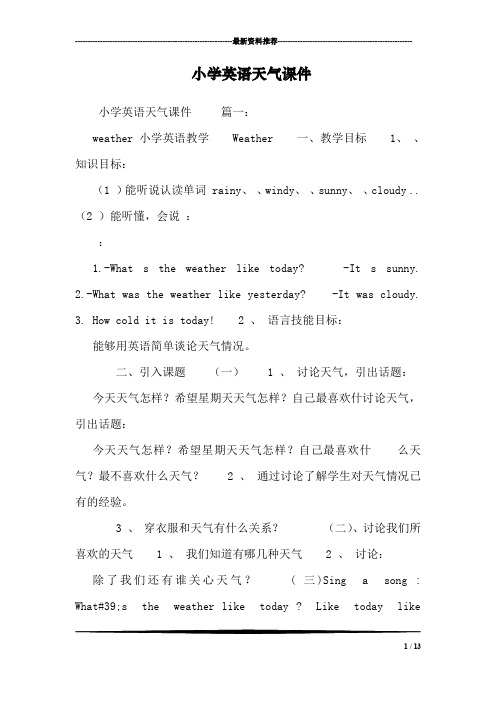少儿英语-天气-weather
- 格式:pptx
- 大小:1.33 MB
- 文档页数:11



weather单词趣记
天气预报,weather.
天气预报是我们日常生活中经常关注的事情。
我们需要知道天气状况,以便做出合适的计划。
而"weather"这个单词,其实也可以用来做一个有趣的记忆游戏。
W Wonderful.
E Exciting.
A Amazing.
T Terrific.
H Happy.
E Energetic.
R Remarkable.
这个游戏的规则很简单,就是用"weather"这个单词的每个字母来形容你对天气的感受。
例如,如果今天的天气让你觉得很棒,你可以说,“Today's weather is wonderful!” 或者“The weather is making me feel happy and energetic!”。
这样,不仅可以帮助你记住"weather"这个单词,还能让你在描述天气时更加生动有趣。
希望这个小游戏能让你在学习英语的过程中更加愉快!。

---------------------------------------------------------------最新资料推荐------------------------------------------------------小学英语天气课件小学英语天气课件篇一:weather 小学英语教学 Weather 一、教学目标 1、、知识目标:(1 )能听说认读单词 rainy、、windy、、sunny、、cloudy .. (2 )能听懂,会说::1.-What s the weather like today? -It s sunny.2.-What was the weather like yesterday? -It was cloudy.3. How cold it is today! 2 、语言技能目标:能够用英语简单谈论天气情况。
二、引入课题(一) 1 、讨论天气,引出话题:今天天气怎样?希望星期天天气怎样?自己最喜欢什讨论天气,引出话题:今天天气怎样?希望星期天天气怎样?自己最喜欢什么天气?最不喜欢什么天气? 2 、通过讨论了解学生对天气情况已有的经验。
3 、穿衣服和天气有什么关系?(二)、讨论我们所喜欢的天气 1 、我们知道有哪几种天气 2 、讨论:除了我们还有谁关心天气?( 三)Sing a song : What#39;s the weather like today ? Like today like1 / 13today What#39;s the weather like today ? Like today like today my dear friend 1 四、Presentation 2 .引导学生分析感叹句的构成。
1. How + adj. + subject + verb !2. What + adj. + noun(singular or plural) + subject + verb! e.g. How cold itis today! What a cold day (it is today)! 2 五、游戏活动 1:坐井观天教师将准备好的井口图片拿出(一张和天气图片一样大小的纸片,:坐井观天教师将准备好的井口图片拿出(一张和天气图片一样大小的纸片,中间挖空一个圆,作成井口的样子),把井口图依次覆盖在不同的天气景象图上,慢慢移动,让学生在移动过程中,根据井口所露的部分帮助小青蛙来猜测井外的天气。

weather 怎么读
“Weather”是一个英语单词,发音为英式音标/ˈweðə(r)/,美式音标/ˈwɛðɝ/。
作为名词,“Weather”的基本含义是“天气”或“气象”,指的是大气层内影响地球生物和环境的各种气象条件和现象,如温度、湿度、风速、降水等。
在发音时,注意将嘴唇略微张开,发出清晰的“W”音,然后过渡到“eðə(r)”或“ɛðɝ”的音。
重音落在第一个音节“wea”或“wet”上,需要在发音时适当强调。
“Weather”对我们的日常生活有着深远的影响。
它影响着我们的出行、工作、农业生产、环境保护等各个方面。
了解天气情况可以帮助我们做出合理的安排和决策,以应对不同的气象条件。
除了作为名词使用外,“Weather”还可以作为动词使用,意为“经受住;使风化;侵蚀;使受风吹雨打;风化;受侵蚀;经受风雨”。
这种用法相对较少见,但在特定的语境下可能会出现。
总之,“Weather”是一个重要且常用的英语单词。
通过掌握其准确发音和多种含义,我们可以更好地理解和使用这个词汇,从而更准确地表达自己的意思。
无论是在日常生活中还是在科学研究中,“Weather”都是一个不可或缺的概念。

天气单词英语天气单词英语是weather,英语单词,主要用作为名词、动词、形容词,作名词时译为“天气;气象;气候;处境,人名;(英)韦瑟”,作动词时译为“经受住;使风化;侵蚀;使受风吹雨打,风化;受侵蚀;经受风雨”,作形容词时译为“露天的;迎风的”。
单词用法1.weather的基本意思是“天气,气象”,指某一地区某一时间的具体天气情况,如阴晴、气温、降水、风力、风向等。
weather引申可指“处境”。
2.weather是不可数名词,其前不可加不定冠词a,即使前面有bad, good等形容词修饰时也不可以,但其复数形式可表示“各种天气”。
3.weather用作名词时意思是“天气”,转化成动词指经过年复一年的风吹日晒使一些东西变质,即“风化”; 也可指经受住严峻的考验而最终“渡过”。
4.weather既可用作不及物动词,也可用作及物动词。
用作及物动词时,后接名词或代词作宾语,有时还可接以形容词充当补足语的复合宾语。
5.weather有时还可用作系动词,后接形容词作表语。
可用于被动结构。
短语搭配Stormy Weather暴风雪; 暴风雨天气; 暴风雨; 风雨交加的天气Weather Underground地下气象员; 地下气象台; 地下气象人; 地下天气weather resistance耐候性; 抗风化;[地质]耐风化; 耐候测试New Weather新气象; 好天气Weather memory天气记录; 天气记载; 天气翻翻看; 天气记忆weather chart天气图; 景象形象图freakish weather彼得The Weather天气; 气候; 什么天气; 天色weather analysis天气分析;[气象]气象分析双语例句How do you like this weather?你喜欢这边的天气吗?How do you like this hot weather?你是怎样喜欢这个热天气的?What weather do you like?你喜欢什麽天气?。
小学四年级英语介绍天气的范文Weather is an important part of our daily lives. It affects the way we dress, the activities we do, and even our mood. As a fourth-grade student, it's important to understand the different types of weather and how they can impact our lives.First, let's talk about the different types of weather. The most common types are sunny, cloudy, rainy, snowy, and windy. Sunny weather is when the sky is clear and the sun is shining brightly. This type of weather is often associated with warm temperatures and is perfect for outdoor activities like playing in the park or going to the beach.Cloudy weather is when the sky is covered with clouds. This can happen for a variety of reasons, such as when water vapor in the air condenses and forms clouds. Cloudy weather can range from a few scattered clouds to a completely overcast sky. Cloudy weather can also lead to other types of weather, such as rain or snow.Rainy weather is when water droplets fall from the sky. This canhappen for a few different reasons, such as when warm air rises and cools, causing the water vapor in the air to condense and fall as rain. Rainy weather can be gentle and refreshing, or it can be heavy and stormy. It's important to dress appropriately for rainy weather, such as wearing a raincoat or bringing an umbrella.Snowy weather is when water vapor in the air freezes and falls to the ground as small, icy crystals. This usually happens when the temperature is below freezing. Snowy weather can be beautiful, with the world covered in a blanket of white, but it can also be challenging to navigate, especially for driving or walking.Finally, windy weather is when the air is moving rapidly. This can be caused by differences in air pressure or other weather patterns. Windy weather can range from a gentle breeze to a powerful storm. It's important to be careful during windy weather, as it can be dangerous for things like flying kites or going for a walk.Now that we've covered the different types of weather, let's talk about how they can impact our lives. The weather can affect the way we dress and the activities we do. For example, on a sunny day, we might wear shorts and a t-shirt and go for a hike or play outside. On a rainy day, we might wear a raincoat and boots and stay indoors to read a book or play board games.The weather can also affect our mood. Many people feel happier and more energetic on sunny days, while cloudy or rainy days can sometimes make us feel a bit gloomy or tired. This is because the weather can affect our brain chemistry and the way we perceive the world around us.It's important to pay attention to the weather forecast and be prepared for the types of weather we might encounter. This can help us stay safe and comfortable, and it can also help us plan our activities more effectively.For example, if we know it's going to be rainy, we can pack an umbrella or raincoat and plan indoor activities. If we know it's going to be windy, we can be extra careful when going outside and avoid activities that might be dangerous in high winds.Overall, understanding the different types of weather and how they can impact our lives is an important part of being a fourth-grade student. By learning about the weather, we can better prepare for the challenges and opportunities it presents, and we can also appreciate the beauty and wonder of the natural world around us.。
weather单词怎么读
weather英式读音为[ˈweðə(r)],美式读音为[ˈweðər]。
它可以作为名词、动词和形容词,当作名词时,译为天气、气候、处境、人名;作动词时,译为经受住、侵蚀等;作形容词时,译为露天的、迎风的。
一、weather的读音是什么英式读音:[ˈweðə(r)]
美式读音:[ˈweðər]
二、weather的中文释义及用法介绍1、当weather作为名词时,意为天气、气象、气候、处境、人名等。
There's going to be a change in the weather .
天气将有变化。
I'm not going out in this weather!
这种天气我不会出门的!
2、当weather作为动词时,意为(因受风吹、日晒、雨淋等,使)退色,变色,变形;经受住,平安地渡过(困难)。
This brick weathers to a warm pinkish-brown colour.
这块砖经日晒雨淋退成了带粉红的暖褐色。
The company just managed to weather the recession.
这家公司勉强渡过了衰退期。
Unpainted wooden furniture weathers to a grey colour...
没有上漆的木制家具会褪成灰色。
3、weather还可以作为形容词,意为露天的;迎风的。